RPG Codex People's Awards: Best RPGs
RPG Codex People's Awards: Best RPGs
Community - posted by Grunker on Tue 26 March 2013, 12:06:17
Tags: Best RPGs; RPG Codex Awards; Top10
Ladies and gentlemen, once again Jaesun has gathered the Codex and forced it to vote on its favourite computer role-playing game pastime. After tallying and compiling, Jaesun sent us the finished list of the ten games the Codex just wouldn't be able to live without. Simultaneously, Felipepepe decided the decline in this place wasn't strong enough, and he set out to gather votes for a similar list of the Codex' favourite console RPGs.
Today, we bring you the results of the polls. Will the final list be monocled? Will it be scandalous? Is it incline? Is it decline? We ask some of the Codex' staff, resident mascots as well as random people on the forum willing to contribute, about their comments on the games the Codex found to be the greatest RPGs ever made. Read the full article to see the results!
Read the full article: RPG Codex People's Awards: Best RPGs
(also, don't forget to help the Codex achieve immortality in Torment: Tides of Numenera - click me!)

Lists compiled by Jaesun and Felipepepe respectively
Story, feature and list editing by Grunker
Logo Art by Felipepepe
Contributions by Average Manatee, Clockwork Knight, Damned Registrations, DarkUnderlord, Felipepepe, Grunker, Infinitron, JarlFrank, Jasede and Trash
Ladies and gentlemen, once again Jaesun has gathered the Codex and forced it to vote on its favourite computer role-playing game pastime. After tallying and compiling, Jaesun sent us the finished list of the ten games the Codex just wouldn't be able to live without. Simultaneously, Felipepepe decided the decline in this place wasn't strong enough, and he set out to gather votes for a similar list of the Codex' favourite console RPGs.
Today, we bring you the results of the polls. Will the final list be monocled? Will it be scandalous? Is it incline? Is it decline? We ask some of the Codex' staff, resident mascots as well as random people on the forum willing to contribute, about their comments on the games the Codex found to be the greatest RPGs ever made. Read on to look at the results, but beware the sporadic spoilers:
RPG Codex Top 10 PC RPGs of All Time
#10: Deus Ex
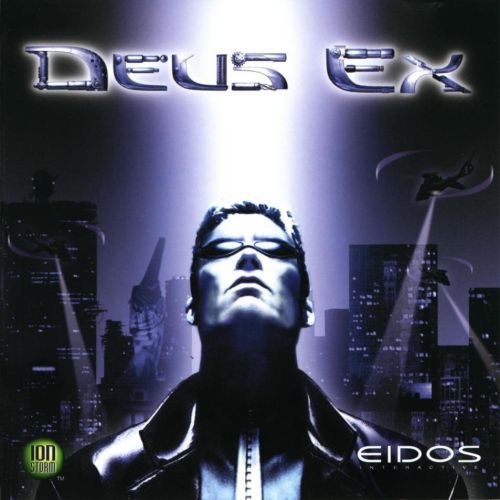
Infinitron (RPG Codex News Staff): Legendary FPS/RPG hybrid. Deus Ex's mechanics are rather wonky and the enemies and combat are downright lame, but the game is still a winner because of content, content, content. The huge, non-linear maps are full of things and are incredibly fun to explore, the near-future setting and storyline are easy to become immersed in, and the augmentations and abilities are just fun to play around with, regardless of how ridiculous or unbalanced they are. The game's mission-based structure keeps players focused on achieving short-term goals in diverse settings, and thus prevents gameplay from losing coherency because of the game's mechanical weaknesses. The game also has C&C, but I find its importance overrated. What's sad about Deus Ex is that it may be the least likely game on this list to ever get a sequel that improves on its weaknesses while completely preserving its qualities, due to the technological limitations of consoles and the ballooning development budget of modern first person games.
Trash (Tacticular Cancer Editor-In-Chief): What's there to say about this game that hasn't been said already? That its mechanics kinda suck on their own but come together marvelously? That you can do things in so many ways that it's almost impossible to fathom the developers imagining them all? That your abilities are utterly unbalanced but amazingly fun to play around with? That its near future storyline of bleak dystopianism, inequality, tyrany, post humanism and conspiracy theories remain utterly fascinating even today? That snooping in your co-workers private email is a very enlightening thing to do? Deus Ex is a hallmark of gaming that really is the very definition of being more than the sum of its parts.
JarlFrank (RPG Codex Administrator): Is Deus Ex even an RPG? I don't know and I don't care: Deus Ex is an amazing game in the tradition of the games made by Looking Glass studios; a first person game with RPG elements and large complex levels with many different possible approaches. Excellent level design, a love for detail, many valid playstyles, a story that includes pretty much every conspiracy theory ever and some of the most hilariously bad voice acting of all time make Deus Ex an excellent game that deserves a spot in our top ten list, regardless of whether it's actually an RPG or not. If I wasn't currently replaying Deus Ex anyway (I'm currently in Hong Kong, the Versalife section) I'd reinstall it right now.
Grunker (RPG Codex Content Staff): Modern stealth games and Deus Ex-likes make one very core mistake in their design, I find, a mistake that is most apparant in Arkane Studio's Dishonored, but which, in some way or another, can be found in almost every stealth game since 2004. They ask you to focus on stealth or combat. What made Deus Ex so mind-blowingly awesome, such a hallmark of gaming, is that it asks you to decide, for each single obstacle you face, which approach you want to use. You're not asked to stealth through the whole game even when combat seems a better approach, or to shoot and kill everyone when creeping through the shadows seems smarter. It doesn't reward you for sticking to a single course of action during the entire game. It lets you decide. The fun of being a thief, a secret agent or a similar type of character, is using different methods and skills for each obstacle. Having you play through the game three times solely using one single tactic on each play-through entirely defeats the purpose of having multiple approaches available. Deus Ex understood what each of its spiritual successors have failed to grasp, and for that, I salute it.
DarkUnderlord (The One Ruler of RPG Codex, Unholy Dictator of the World and Glorious Superadministrator of the Forums): I never asked for this.
#9: Fallout: New Vegas, The Elder Scrolls: Morrowind and Temple of Elemental Evil
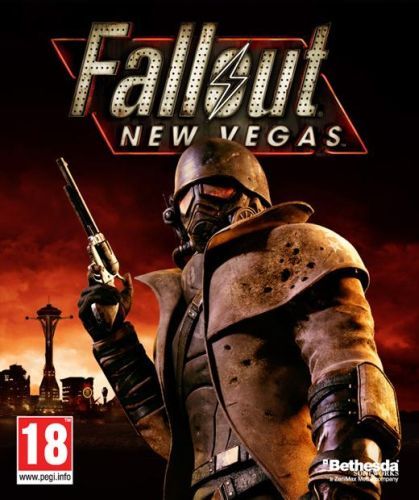
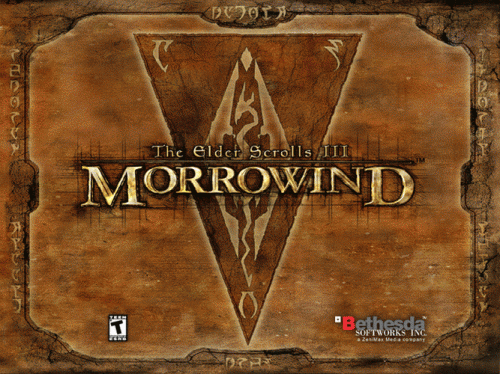
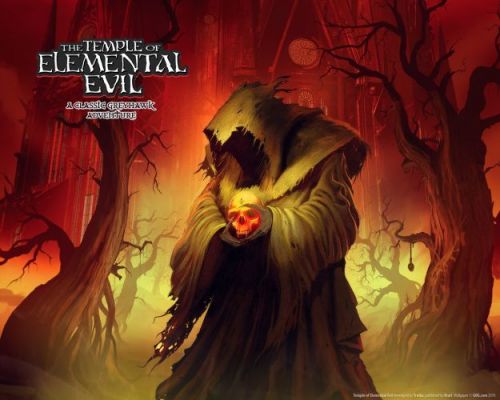
Infinitron: I'll say a few words about Morrowind. It's a Bethesda LARPing simulator which just happens to have possibly the most intricate setting and lore of any computer game ever. You might enjoy Morrowind if you play it as an "adventuring simulator", rather than as a game meant to be ruthlessly "exploited" by talking to everybody, exploring everywhere and killing everything, and picking up and selling everything. The game's RPG mechanics, while satisfyingly complex, are very brittle and will break quickly if you play in this way (not to mention that it's also very boring). Morrowind can be a rewarding game if you manage to immerse yourself in the setting, but it's not for everybody.
Trash: Fallout: New Vegas, eh? Apart from the novelty of stepping outside of a vault in first person and seeing how Bethesda's notion of promoting tolerance wiped out an entire settlement I really couldn't care less about anything Fallout in that engine again. And then Obsidian, famous for being ambitious designers who apparantly cannot deliver a finished and QA'ed game, got their mittens on this franchise, and shit changed. The engine was never more than okayish but it was the content that made all the difference. Hiking up that mountain to find a crazy hermit nightkin dressed up in a wig and pink glasses? A posh casino where the management turn out to be insane cannibals dining on their clientele? The game just kept on giving and giving. Making an open world game in a rather middle of the road engine and then cramming it with so much personality and life takes some mad talent. Kudos.
JarlFrank: It tells you a lot about Troika's excellence that every single game of theirs made it into the Codex' top ten list. ToEE just barely made it, though, because its only strength was combat and everything else was just mediocre or even bad. The starting village had a lot of boring fetch quests, the story was nothing special and there wasn't any character interaction of note. The combat, however, was the perfect implementation of D&D 3.5 into a computer game, and it is this tactical, turn-based combat that got ToEE into this list.
Grunker: A hiking-simulator with a very complex and rewarding setting, an open-world game with an immense focus on rewarding exploration and complex inter-faction mechanics and a bare-bones combat-simulator using D&D 3.5 rules. It's no coincidence that these three games barely make the top 10, with an astonishingly identical amount of votes. They each represent three core elements of the good RPG: what each of these games choose to focus on they each do extremely well, to the exclusion of everything else. Each game excels in one department and is lukewarm in all others.
DarkUnderlord: Morrowind? I bought it because of the pretty graphics. It's fun because it has spears and you can just levitate everywhere and play whack-a-mole. Temple of Elemental Evil? It's nice. Fallout: New Vegas? Haven't had any incentive to finish Fallout 3, was going to do New Vegas after I did that. Game is more like Oblivion anyway and I played that already.
#8: Icewind Dale

Infinitron: Low-budget Infinity Engine dungeon crawling spinoff which features oldschool full party creation. IWD's music and graphics are better than BG's, and Black Isle's writing is more mature and subdued compared to Bioware's. As a dungeon crawler, the combat in IWD takes front and center, and the combat encounters are appropriately more well designed. However, even moreso than Torment, the game doesn't provide the traditional sense of wide scope that other games on this list do, which limits it appeal. You might not like this game if you don't enjoy playing around with AD&D character builds and testing their mettle in tactical combat, and even if you do, you might find it "too much of a good thing".
Trash: Infinity Engine combat on a low budget. Woe is me. Well, that was what I thought at first, but for some reason the lack of pretension combined with an excellent artistic design made for a entertaining if simplistic hack and slash romp. A few well designed dungeons, encounters and set-pieces later I had to admit to myself that sometimes less is indeed more. Not more than the sum of its parts but an excellent use of what little means there were which resulted in a game that was simply fun to play.
JarlFrank: Icewind Dale is a linear dungeon romp with many good combat encounters and beautiful art. The fact that this game managed to enter the Codex' list of top ten RPGs shows that real-time with pause combat can be good if it's done right. Too bad the Infinity Engine games are the only games in history up to date where RTwP was actually done right.
Grunker: Boy, the Codex loves the Infinity Engine (just look at this list!). And rightly so. Do you like the Infinity Engine and the combat that comes attached to it? If yes, you will almost certainly have a good time with Icewind Dale. If no, stay the fuck away. You'll hate it.
DarkUnderlord: Haven't played it. Got bored with the combat system.
#7: Baldur's Gate
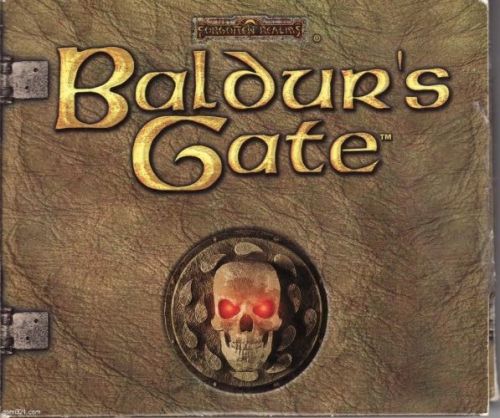
Infinitron: The archetypical cRPG of the late 90s, BG was remarkable simply for being excellent at everything it tried to do. The graphics, the sound, the music, the interface, the atmosphere and the writing all came together magnificently in a way that few cRPGs had achieved before (or since). The AD&D ruleset and content, combined with the RTS-like Infinity Engine tactical combat implementation, provided the game with immense depth "out of the box" in a seemingly effortless fashion. Baldur's Gate is begrudged by many on the Codex for its refusal to continue in Fallout's C&C/reactivity-centric direction and for its lack of turn-based combat. Personally, I don't consider those features very important in an RPG, if they don't have well-designed mechanics and content to back them up.
Trash: This great RPG that we got near the end of the 90's was to me the epitome of the decline of the genre. It also reminded me a whole lot of Dark Sun: Shattered Lands from SSI. Although a lot prettier and a whole lot less interesting. The lack of any reactivity in the gameworld and the abundance of pointless exploration of otherwise mostly static maps quickly bored me. The dungeons should've been kinda fun to fight through if the combat wasn't so incredibly dull. Got to admit though, I really enjoyed the opening video and quote from Nietzsche. "Battle not with monsters, lest ye become a monster, and if you gaze into the abyss, the abyss gazes also into you." Shame the game never really builds upon the expectation for something interesting that quote instilled in me.
JarlFrank: The predecessor of Baldur's Gate 2 (obviously, duh) was a solid game, but it's not as good as its sequel. The writing is even more amateurish and the story is way more generic, the combat encounters aren't half as good (well, that's probably also a fault of low level D&D) and it doesn't feel as tight and polished as BG2. It's not a bad game, but personally I wouldn't rate it this high. It's still the second-best Bioware game ever, but then again that's not saying much.
Grunker: Infinitron is spot on. Baldur's Gate gets bashed a lot for its story, but it does the coming-of-age cliché well, and the best part is that it isn't pretentious. Baldur's Gate is what is, and it's very good at it.
DarkUnderlord: Haven't played it. Got bored with the combat system.
#6: Vampire: The Masquerade - Bloodlines
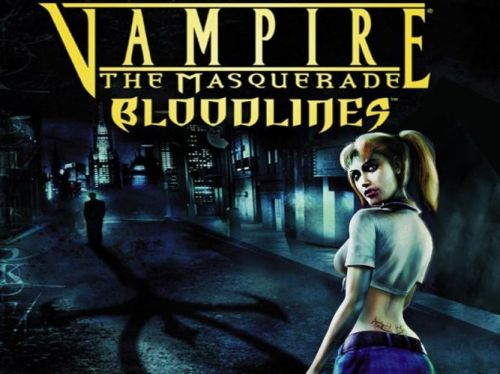
Trash: By the time this game was in production Troika already had cemented their reputation as producer of games with awesome ideas and horrid QA that never were quite finished when they shipped. Still, with a license like Vampire: The Masquarade and the use of the newfangled and amazing looking Half Life 2 engine I figured they had finally hit their stride. Or at least gotten their big break. For a while that actually seems to be the case when you start the game. Graphics looked rather cool, the voice acting was great and those first areas really showcase all that Troika was positively famous for. Then you hit the sewers and all those other things Troika was famous for start making their appearances and slowly but surely take over completely. I really wanted to love this one and there is so much to love but then, well, you get that cold shower and realise that this was one of those games that are almost there but not quite.
JarlFrank: The third and, sadly, last game made by the heroes of RPG development, Troika Games, is a first person action RPG set in the Vampire: The Masquerade setting by White Wolf. It features very well-written dialogues, believable characters and some great facial animation that serves to enhance the believability of the characters. The game excels at offering the player different paths - be it combat, diplomacy or stealth. The final third of the game is a big letdown, however, with long linear corridors filled with monsters that have to be killed or avoided, but that can be blamed on the devs not having had enough time to polish the final parts of the game. Nevertheless, the first two thirds of Bloodlines shine with good level design and the game is very replayable thanks to two playable vampire clans that differ a lot from the rest: the Nosferatu, who have to stay out of sight of humans all the time due to their hideous appearance, and the Malkavians who are batshit insane and get some really weird dialogues.
Grunker: VtM: Bloodlines is the definition of a flawed gem and I must admit it: I love this game more than it deserves. Yes, parts of the game are boring dungeon crawls with bad combat. Yes, the game is a terrible amalgamation of different elements of gameplay chugged into a poor shooter. But the story, the characters and the Deus Ex-esque game mechanics put this game right up there with the best for me. I said it was the definition of a flawed gem, and I mean it: The game is genuinely good, but it could have been so much better. Though it's hardly an important feature in a game, Bloodlines is the one game that deserves mention for its voice-acting alone. As one of the only games, Bloodlines showed that geuinely fantastic voice acting can be a strength of its own, if it is implemented correctly.
DarkUnderlord: Good for what it was.
#5: Arcanum: Of Steamworks and Magick Obscura
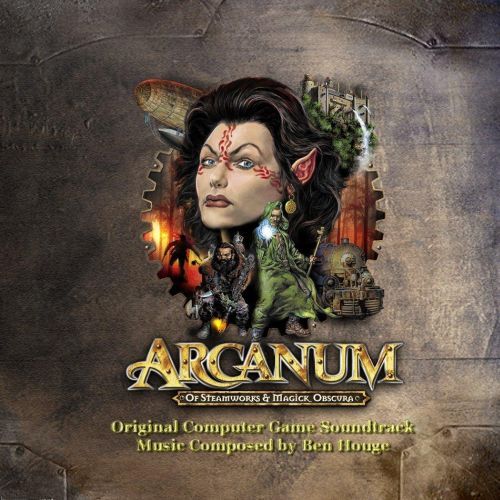
Trash: This game I really was dying for. Made by Troika? Yesss. Steampunk? Yay! A whole continent to explore? Hell yeah! And right at the start you got that great video of the zeppelin being attacked and crashing. Awesome. And then you began the game and it all looked kinda icky and the combat kinda sucked in both real-time and turn-based. But all the options, character design and dialogue was pretty neat so I perked up again. And kept perking up. Virgil turning out to be a bit of a twat was neat. Just when you felt the story was going to be a bit stereotype the game threw a new twist. Not to mention all the different ways you could do things or how everything reacted to you. I mean, what player didn't love reading about his own exploits in the newspaper? Well, I did and even when the exploration really wasn't all it was made to be the good kept outpacing the bad. And then I got into dungeon after dungeon and the game kinda died for me. Really, who designed those? Soulless mazes with no sense of purpose apart from letting you get from A to B and step in a few traps and kill a few monsters along the way. Loathed it. While there was so much goodness and potential in the game I could never quite forgive Troika for the shit design of Arcanum's dungeons.JarlFrank: Why didn't this game reach first place? Arcanum is the best RPG made to this day, and I'm not sure if it will ever be surpassed. Yes, it's obvious I'm a fanboy, isn't it? I actually found the Codex back in late 2006 by searching for stuff about Arcanum. The awesome setting of 19th century steampunk mixed with traditional high fantasy, the complex character system with many different possibilities of character development and the incredible amount of choice and consequence make this into my favourite RPG. There are just so many different things to do and to discover, including some hidden quests and many different multiple endings. In my opinion, Arcanum deserves first place in this list. Oh yeah, the combat is supposed to be kinda bad, but I always thought it was okay.
Grunker: Why didn't it reach first place, JarlFrank? I'll tell you why: I have a huge amount of respect for what this game tries with its character system, its exploration and its deep story and reactivity. The sad fact of the matter is that all of the various elements that make up this game are simply broken. Arcanum is a vast desert of wasted potential. It is a game that showed us just how great RPGs could be, but failed in every department to deliver itself. As is, Arcanum, for me, is a gigantic vision of what could be if a dedicated and skilled RPG developer had the time and resources to make the complete RPG. As such, I completely understand that Arcanum finds itself in the Top10 list, because no other game has presented us with this true vision of just how much the complete RPG could provide. The fact is, though, that Arcanum provides none of it itself.
DarkUnderlord: I enjoyed this very much and started to make some mods for it but then stopped that to waste time on a Fallout mod which I ended up giving up on too. I even wrote a modding tutorial for Arcanum but gave up on that too because most of the people who contacted me about it were retarded and made me despair for humanity.
#4: Baldur's Gate II: Shadows of Amn
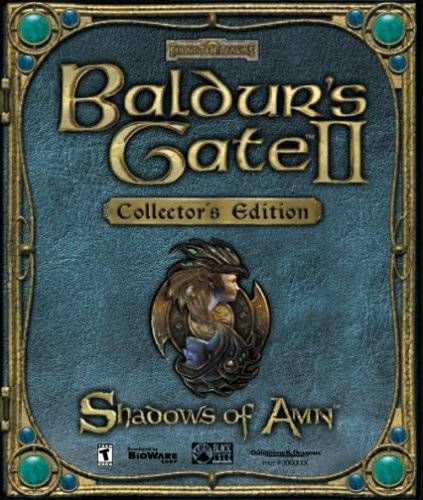
Infinitron: Somehow bigger and longer than BG1 despite a large portion of the game taking place in one city, BG2 is the epitome of wacky high-level AD&D in computer game form. On the Codex it is widely considered to be much better than its predecessor, due to its "adventure city full of sidequests" structure which is extremely popular here, as well as the inherently greater complexity in its high level combat. Personally, I don't think the two games should be compared in such a way, as they each set out to achieve a different goal, and they each succeeded.
Trash: Shadows of Amn. Oh, boy. They want me to talk about this one. Erhm. Well, it's always been an incredible mixed bag for me. Loved the feel of the city. Digged those production values. Enjoyed a party suddenly bantering instead of being a bunch of soulless automatons. Those short but wonderfull descriptions you sometimes stumbled into. Not to mention that having a stronghold with its own questline was awesome. Yup, great. But! Yes, there is a but for me. I really never liked the combat. Not just the pausing with the spacebar and all that. No, I really disliked that every encounter felt like a puzzle where you had to cast the right spells in the right order to get through the defenses of the enemy. Screw that, I just want to chop 'em up.
JarlFrank: When I first played BG2, it immediately managed to grab me. Everything about it was just good - the graphics, the interface (to this day I believe that the Infinity Engine had one of the best interfaces ever), the story (even though the writing was, at times, quite amateurish) and even the combat. It's a game chock full of content, with solid writing and combat that is actually good despite being real-time with pause. Baldur's Gate 2 is epic fantasy done right, and it's definitely the best game Bioware ever made. With its huge amount of sidequests, many different possibilities of character development and difficult combat encounters, the Codex even manages to forgive BG2 the fact that it's the game that introduced romances into the genre and gives it a well-deserved place in the top ten.
Grunker: SO. MUCH. CONTENT. Baldur's Gate 2 is easily one of my favourite games. Compared to the production values, this game provides the player with an amount of quality content unmatched in any other RPG, in my opinion. The diversity in encounters, spells, quests and, well, just about everything makes Baldur's Gate 2 a unique and complete experience. The combat is often criticized on the Codex for not being turn-based. This, in my mind, is quite like criticizing a cat for not being a dog. Baldur's Gate 2 has everything I look for in an RPG: A multitude of quests, vast amounts of unique and interesting loot, myriads of monsters to fight and a story which, while not exactly Shakespeare-material, is quite solid and has one of video gaming's most memorable villains. Oh, and Jarl, it doesn't have one of the best interfaces ever, it has THE best interface ever.
DarkUnderlord: Haven't played it. Got bored with the combat system.
#3: Fallout 2
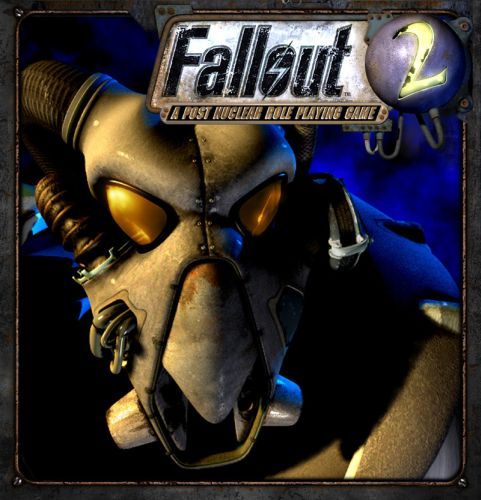
Infinitron: Like Fallout, but bigger and crazier. Many words have been written about Fallout 2's lack of seriousness compared to its predecessor. Rather than add to that discussion, I'll just say that Fallout 2's larger size and greater length give its mechanics more opportunities to shine, and thus grant the game more systemic depth as an RPG. Sometimes, quantity really does have a quality of its own.
Trash: While the Americans got a glorious censorship free version that had people die in all sorts of gory ways we Europeans had to do with a seriously toned down version. That infraction on my rights to see people explode like a blood sausage infuriated me. Worse was that this was before the days of easy internet access, so I had to try and locate an uncensored version. I ordered it through an outlet that never delivered, bothered the local gameshop until they told me to piss off and looked everywhere. Just as I was about to give up I found an imported US version in a bargain bin at some PC dumping fair. Finally I could mow down children and do drugs like I was supposed to! And, uhm, it really was a great rpg as well.
JarlFrank: Fallout 2 is basically Fallout with more content and Monty Python references. It's more of the same, but with a less focused story, less thick atmosphere and more humour. Some people prefer Fallout 2 over the original Fallout because it has a lot more content and offers the player even more choices, others dislike its lack of focus, somtimes immersion-breaking silliness and the "themepark" feeling of the world. Luckily, I'm not too much of a Fallout fan and therefore never cared about the heated discussion of which Fallout is better and why and just enjoy both of them equally. (although I would have to agree that Fallout 1 was, overall, the better experience)
Grunker: Fallout 2, for me, is to Fallout what Baldur's Gate 2 was to Baldur's Gate. Nothing much has changed in the engine, and this recycling allowed for a bigger, more content-filled experience. I don't care much for the discussion that one is greatly different than the other in quality; the games are so similar in so many ways that what's left is still a great RPG, and that is what matters.
DarkUnderlord: Fallout 2 is not as good as Fallout 1 except there's more shit to do but the ending is lame.
#2: Planescape: Torment
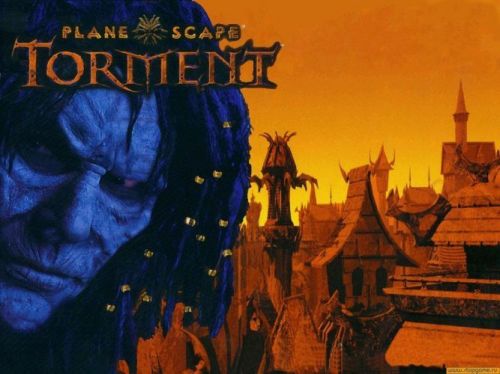
Infinitron: Torment emphasizes the dialogue-heaviness, the reactivity and the C&C from Fallout and puts everything else in the background. The traditional RPG mechanics are still there, in the form of the Infinity Engine's AD&D implementation, but they go down much faster and smoother. Combined with a setting that is even quirkier than Fallout's, Torment is better than Fallout in nearly all of the things that Fallout is best at, and thus is arguably the better game. However, it doesn't provide the same amount of the traditional "wide open freeform sandbox" feel that Fallout and other games on this list do, and that sense of limited scope limits its appeal as a "general purpose" RPG.
Trash: In almost every game the tutorial is something you endure. And from enduring it you grow stronger, or at least learn how to play the game or something. Planescape was different. Waking up on a cold stone slab with a dodgy floating skull talking to you like he's known you forever while you had all those weird stitched up zombies shuffling around was amazing. Fresh even. Hell, compared to what games usually did it even felt truly alien. Never before did a game suck me in so thoroughly into such a new and fascinating world as Planescape did just through that mortuary. And then you discovered it was just the starting location and you had only just begun the journey.
JarlFrank: Torment is one of those games that does one thing really, really well but doesn't really bother with the rest. The story is probably one of the best stories ever put into a cPRG and the character interaction is excellent, as are the characters themselves. By focusing so much on story, characters and dialogue the developers neglected combat and managed to create the most banal and boring combat of all the Infinity Engine games. This is not too big an issue, however, as you can often skip combat and in those places where you can't, it's not very hard anyway so it's generally quickly gotten over with. Its excellence in everything but combat definitely elevates Planescape: Torment to the top ten RPGs of all time, and this second place in our list is well-deserved.
Grunker: This game is unlike anything I'd ever played before and have ever played since. Everything was strange, and you never knew what to expect. One of the things I miss the most about gaming in the years past is the feeling of being thrust into a completely alien world, where nothing can be expected, and everything is new and surprising. Oh yeah, and "DON'T TRUST THE...", yeah. That moment in gaming was singed into my brain, probably the most memorable moment in gaming for me. Planescape: Torment is a game unlike any other, and it thouroughly deserves its spot on this list.
DarkUnderlord: Haven't played it. Got bored with the combat system.
#1: Fallout
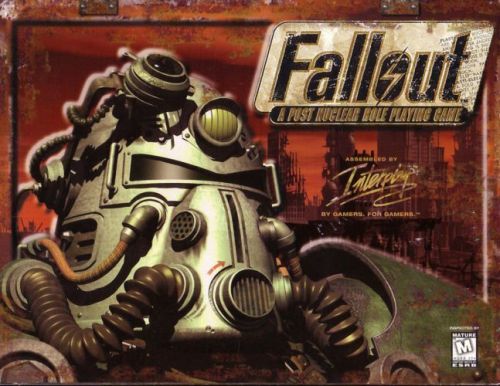
Infinitron: The first game to really successfully combine elements of dialogue-heavy reactivity, C&C and adventure gaming in the framework of a traditional RPG, something that a few CRPGs had begun to progress towards in the early 90s, but never quite managed to do before the genre's semi-collapse in the mid-90s. Combined with its simplistic but enjoyably violent combat (a quality which is somehow enhanced by its incongruent turn-based nature) and quirky setting, Fallout is understandably extremely popular on the Codex. However, as an RPG proper, it's not nearly as hardcore as some of its fans think it is.
Trash: I actually remember being really stoked for this game's release. Not because of any mention of reactivity or it being the salvation of role playing games on the PC. No, it was because of the infamous 'watch enemies explode like a blood sausage' comment that I really wanted to give this game a try. Boy did it deliver. Every weapon seemed to cause a new groovy way for my foes to fell. Burned to a crisp, chunks blown out or ripped in half. Whoo. And then you had those nasty little descriptions that just made me want to try and shoot people in the nuts and eyes. Fucking awesome man. Oh, and it also was like really good as an RPG. Yup.
JarlFrank: This is one of those classics that passed beyond my radar and I've only played it after joining the Codex. I had played many other great RPGs that came after Fallout already, so it didn't leave the same impression with me as it did with most other Codexers - but it's a good game, especially when you consider that it was one of the first of its kind and was released during a time of stagnation within the genre. The complex character system, many choices available to the player and violent combat makes it into a definite Codex favourite. Personally, I'd place it much lower on my top ten list (BURN THE HERETIC!) but it's definitely one of these games that does almost everything right. While most of the other Codex favourites are flawed gems, Fallout is a gem without any major flaws, and how often do you find a game like that?
Grunker: Like JarlFrank, I tried this game many years after its release. As a true P&P-fag, I recall first being quite disappointed in the character system and the wasted opportunity that it could have been the first game made with the near-perfect GURPS character system. However, my disappointment soon vanished. While Fallout isn't one of my favourite games due to my personal tastes, I have a great deal of admiration for the game in the way it meshes almost complete non-linearity with a compelling narrative, and how it manages to make its combat and character system fun despite their simplicity.
DarkUnderlord: Fallout is good.
And so, our prestigious compilation of the Codex' most beloved RPGs comes to an end. But wait, there's more! Who doesn't want to know which console RPGs the Codex find most appealing (I know I sure don't!)? Read on to discover the secrets of the Codex' preferences here, hitherto untold, until Felipepepe got the bright idea to poll the Codex on its favourite console RPGs.
RPG Codex Top 10 Console RPGs of All Time
#10: Final Fantasy IX
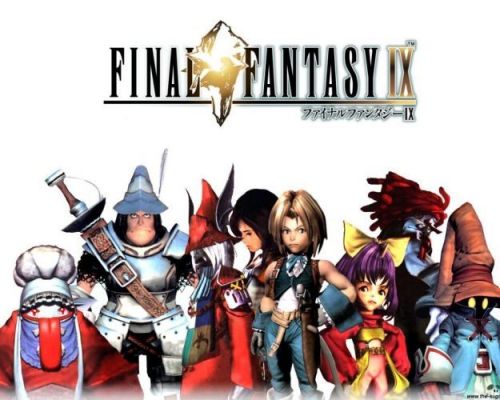
Felipepepe (RPG Codex Content Staff's Favourite Little Helper): Quite a surprise, FFIX takes the 10th position. After all the romance, realistic graphics and futuristic world of FFVIII, Square returns to “fantasy” and calls back Yoshitaka Amano to make a magical world, full of fantastic creatures, massive summons and a lighthearted princess story, played by cutesy SD characters. However, fear not Codexia, for beneath all the furries lies some of the best gameplay in the series, with diverse party members, fine-tuned combat and great world exploration, not to mention addictive mini-games such as the Tetra Master card game and Chocobo Treasure Hunting.
Damned Registrations (RPG Codex Console Connoisseur): I can only assume a large number of people (at least 11 apparently) haven't even played console RPGs before the PSX era, or played less than 10 console RPGs ever. First of all, the combat was tedious as hell, since just like FF8, everything was vastly over animated and every combat had to include panning around the backdrop a while. Characters didn't even feel that different since although they had unique skills, almost all of these skills were utterly useless. They were also cartoony and goofy as hell, which killed the mood. Steiner and Quina in particular were huge eyesores (with awful dialogue). Equipment was brought back, but its effects were so minor it felt pointless, which in turn made exploration pointless since there was nothing worthwhile to find. The story was really nonsensical shit that didn't get much explanation and culminated in a boss you've never heard of appearing out of nowhere for no reason. The whole game feels like a tribute to people who liked FF1-6 by people who never played FF1-6.
Jasede (RPG Codex Hangaround): Final Fantasy IX is a throw-back to "older" Final Fantasies - which is to say, before VII and VIII. In succeeds in its role well enough and happens to be a charming game with decent combat, good music and somewhat dated graphics. I find it easy to recommend this one the most out of all other "new generation" Final Fantasy games, simply because it happens to be the most playable and least obnoxious. As soon as X comes around the characters and the stories of all FF games hence turned from goofy and somewhat interesting to violently stupid and obnoxious.
Clockwork Knight (RPG Codex Mascot): This one is weird. A throwback to the more medieval earlier titles in the series, but with the emphasis on storyline from the later titles. Basically, it's what FF7 would be if it hadn't veered on the "Magitek" side of FF6. The Trance System seems more like an afterthought, as if someone at Square noticed that the game should have Limit Breaks because people like that in FF7. The characters are likeable, except for Quina who is just... there.
#8: Vagrant Story and Final Fantasy VII
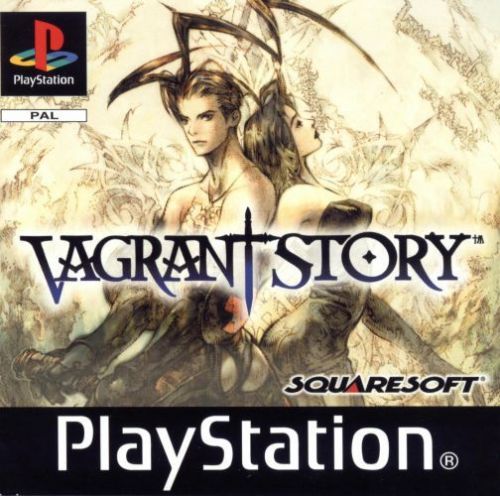
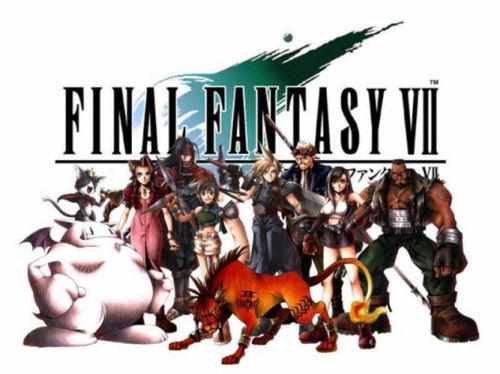
Felipepepe: Tied at #8 with the standard for all modern jRPGs is the game many here wish was the real standard for them. Vagrant Story is a truly unique game, from its combat that blends real-time movement with combos, turn-based elements and even aimed shots, to the complex magic and crafting systems, all taking place in massive dungeon crawls, with little to no dialogues. Developed by Mr. Yasumi Matsuno, also responsible for FF Tactics, Tactics Ogre and FFXII, Vagrant Story is a interesting twist in what one would expect from a JRPG.
Final Fantasy VII is undoubtedly one of the most iconic images in gaming, Cloud Strife and his massive buster sword marked more than the first 3D Final Fantasy game. FF7 set in stone many of the concepts that would define JRPGs in the years to come: linear, complex and bizarre plots, "exotic" character designs, minute-long summon animations, limit breaks, massive boss fights... it’s all there. Some see it as the quintessential JRPG, others as everything that's wrong with weeaboo games. Both have a point.
Damned Registrations: Ugh. Vagrant Story. Not a game I enjoyed much. I can see the appeal - it has great atmosphere and a very cool story. But I disliked most everything else about it. The exploration was pretty open, but I pretty much never found anything worthwhile. Everything is just some minor variation of what types of enemies the weapon or armour is most effective against. You could easily play through the whole game stripped naked because of the combat system, which renders you invincible if you time attacks and defenses.
As for Final Fantasy VII, I have some mixed feelings on this one. Exploration is often well rewarded with one of a kind materia that unlocks totally different ways of setting up your party, which was probably the best part of the game. There are even 2 entirely optional party members out of a cast of just 8. Some of the secrets were of the really asinine variety that you basically need a guidebook for. Limit breaks made combat somewhat interesting even when it was easy. Everyone bashes the silly block arms when Cloud jumps off the train, but most of the game is spent zoomed so far out he's a little blob on a gorgeous background anyways, and the 3d models used in combat look much, much better. The story isn't terribly gripping though, most of the cast isn't likeable, and the translation combined with the weird ass plot makes everything outright hard to follow. I wouldn't say this is a bad game, it's about as good as FF6 probably, all things considered. But it's overrated by the huge number of people who had it as their first rpg.
Jasede: Final Fantasy VII is terrible. Well, I don't like it. But I'll say what I do like about it: the music of this game, as well as the rendered backgrounds, were excellent, especially in their own time. Unfortunately that is the only thing this game has to recommend for itself. The battles are pointless, the materia system inane and a regression from the better job systems of prior FF installments, the characters dull at best, though terribly stupid might be more fitting. Speaking of terribly stupid, that would make a good tag-line for its plot summary and dialogue.
Average Manatee (Random RPG Codex Poster): I quit Final Fantasy VII at the point where Cloud became a cross-dressing prostitute. Not that I have anything against a decent cross-dressing prostitute joke, but it was the final straw in the boredom that I had up to that point. I figured that seeing a main character I hate have his anal virginity taken off-screen was the high point of the whole game and there couldn't be anything more worth playing for.
Clockwork Knight: You are the reinforcements. Vagrant Story throws you into a subterranean dungeon and tells you to reach the end. This wouldn't make it noteworthy, were it not for the unique combat. Aim at your enemies limbs' with customized weapons. It is relatively easy to abuse this system by making hyperspecialized weapons designed to murder certain types of enemies, but that's a small price to pay for satisfying combat. Apart from the hero's infamous assless chaps, the gothic art style with realistic proportioned bodies, big scary bosses and hands-off plot makes Vagrant Story feel like an ancestor to Demons' Souls and its sequel.
Final Fantasy VII, on the other hand, is possibly one of the most overrated games of all time, partly because it was released at the right time on the right system. This does not mean it should be avoided though, unless you really despise the series. It is more of the same, but sadly the materia system takes out the uniqueness of each character. While in theory it's nice to easily swap spells and abilities, it makes choosing a party mostly an issue of whose dialogue you want to hear on the next cutscene, with minimal difference in actual gameplay. A party consisting of a mercenary, a huge man with a machinegun implanted on his arm and a panther shouldn't play just like a party consisting of a frail healer, a teenage ninja girl and a... whatever the fuck Cait Sith is supposed to be.
#6: Demon's Souls and Xenogears
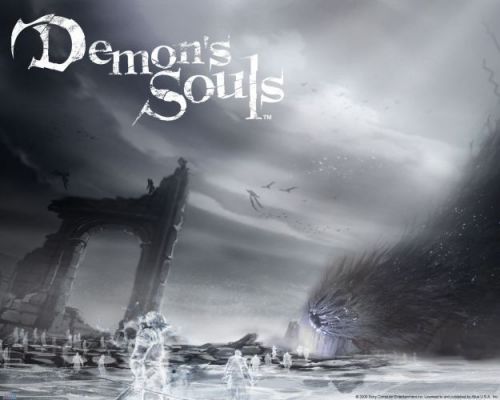
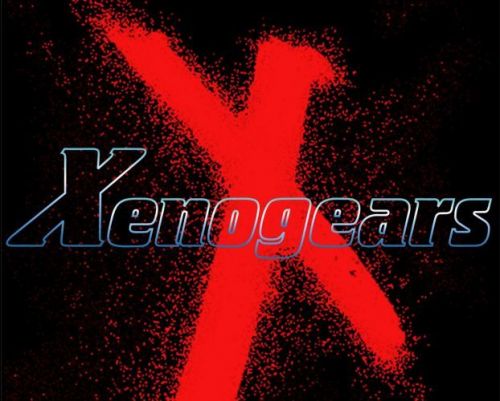
Felipepepe: Before Dark Souls, there was Demon's Souls. Some may say it's a less polished title than its successor, while others will say it's a more hardcore experience, with some very punishing boss battles, fewer checkpoints and a world that reacts to and hides a lot from the player. Regardless, it’s an impressive achievement that From Software would release a title that goes against so many trends and rules of modern gaming, and an even greater feat that it succeeded.
Xenogears is one of the most ambitious games ever made, with hours and hours of very hard gameplay, martial arts, giant robot combat, religion, philosophy, multiple planes of existence and an insane amount of texts and dialogs, Xenogears is the Planescape: Torment of JRPGs,
Damned Registrations: Well, most of what is applicable to Dark Souls is applicable to Demon's Souls too, albeit less well done. Your options on how to explore are more limited, though you do still do have multiple stages to progress through at any given time and often multiple paths through those stages. Exploration is quite rewarding, with some cool secrets scattered around. Though you're unlikely to find any of the best stuff (requiring world tendency changes) without outside help.
Xenogears though, is a game I'm surprised made it to this spot, since so many people hate the infamous disc 2 cutscene of doom, stretching on for over half an hour. Personally I didn't mind too much - the game is MASSIVE in a way few games are, and by that point (immediately after a very long and difficult boss fight I had to attempt multiple times) I was ready for a nice long breather. The story is an interesting one, and the gameplay is fun, especially the parts where you get to stomp around in giant robots, which I can't recall doing in any other game - though I'm sure it's not terribly rare in Japan. Even the minor random encounters were enjoyable to fight through, the game had some decent difficulty, and unlocking new combat moves felt really good.
Jasede: If Dark Souls is part of the holy trinity of console gaming, then Demon's Souls is the Betrayal of Krondor, the Bloodlines and the Darklands of it - the titles we always love to remember, but don't replay nearly as often. That is to say, the game is very memorable, though noticably less polished than its sequel. Regardless, just like Dark Souls, it hollows you out with relentlessly fair challenge and a growing, gnawing sense of desolation, despair and futility, thanks to the sparse, yet wonderfully crafted lore of its dreary, frightening and above all, lonely world.
Average Manatee: Dark Souls didn't come out of nowhere. While lacking refinements of the sequel with regards to combat and open world, Demon's Souls is still a lovely adventure as a damned demon slayer in a damned world, and worlds 3-1 and 5-3 arguably surpass anything in Dark Souls.
Clockwork Knight: Turns out letting a teenager pilot a giant war machine can have disastrous consequences, who knew. Xenogears, with mostly likeable characters, an interesting plot and a combo-based combat system, is a good recomendation even for people who don't like JRPGs. Exploring will net you all sorts of hidden items and characters, including a lot of missable ones that turn this into a completist's nightmare. Some people speak of a second disc, but it doesn't exist.
#5: Shin Megami Tensei III: Nocturne
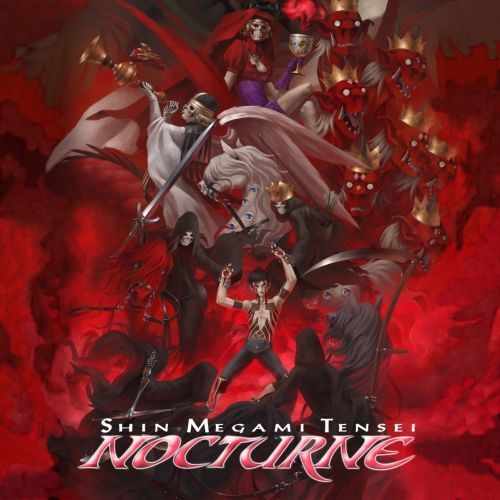
Felipepepe: Probably the most Codexian-friendly JRPG on the list. Forget lighthearted teenage adventures; as soon as the game starts, the world is destroyed, and you’re turned into a demon that must fight, recruit, bribe or seduce other demons to shape a new world. The game has very challenging turn-based combat, over 100 recruitable demons for your party (including Dante from Devil May Cry), great dungeon design, and several endings depending on the paths you choose to follow, that are way more mature and diverse that binary good & evil choices.
Damned Registrations: Probably the best turn based console game to come out in the last decade. The combat system isn't terribly complex, but it's elegant and has a lot of interactions and ways to take advantage of it's simple elements. A lot of the battles offer some decent difficulty, and players smart enough will be rewarded by being able to get past fights without needing to step back and change things to handle individual bosses or enemies. Unfortunately, the game suffers outside of combat. There is no equipment to be had, so it's rare that you feel rewarded by going out of your way to explore - usually you just get some money or consumable items. The plot is pretty minimalistic and nonsensical. That said, at least it's original. No farmer turned hero watching his village burned by the evil empire shit to be found here.
Jasede: It might be because I'm such a sucker for desolate worlds and being depressed, but this game hits many of the right notes from the very start: the world ends, you're thrown into a empty land with no clear idea what to do, and it just goes from there. The story is minimalist and does not get in your way as you explore your way through many different - albeit sometimes bland - dungeons. Fortunately, the combat and party systems are outstanding and the high - if not extreme - difficulty should keep you entertained for hours on end.
Average Manatee: An innovative turn-based combat and ally-creation system that let's you form and mold your undoubtably unique party from the (very cool) enemies you face. Beautiful environments to explore with tricks and traps littered about. And a punishing difficulty that is not in the least bit overrated. Surviving the end of the world is the tutorial. Surviving the birth of the new one is the game.
Clockwork Knight: Shin Megami Tensei III: Nocturne AKA Pokemon: Mayan Edition. Recruit bros to help you achieve your objectives in a ruined world. The combat system is based on gaining more turns for doing good and losing turns for messing up. This means that things can go south FAST, and every battle has the potential to wipe you out if aren't ready to counter the skills of the enemies in that area. The gameworld is barebones, with shops scattered through the dungeons. You are rarely in a "safe place" where you can talk to locals, but it fits the game's tone.
#4: Dark Souls
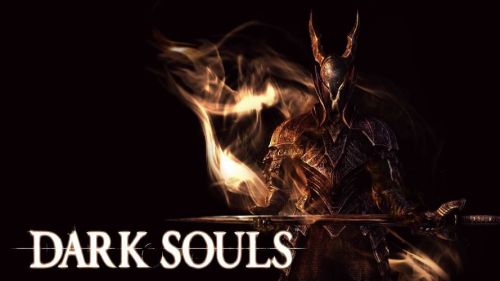
Felipepepe: One of the most debated recent titles on the Codex, Dark Souls is a solid game. Tight controls, challenging combat, great level design and fantastic atmosphere, charismatic characters, impressive boss battles and a massive amount of weapons and armors, so well crafted that every player has his or her own playstyle. Dark Souls isn’t a revolution, a breakthrough or the salvation of all gaming; it’s simply a very good action-RPG, that does everything right.
Damned Registrations: Finally a game with some challenge to it. Actually, since the game is pretty open and there are many ways to play it, the difficulty gets both over and understated quite a bit. Although people regard this as being an action game, your equipment has such a massive impact on how much damage you dish out and take that it can completely trivialize most fights if you're well prepared. And you don't even need to grind for it. Just a matter of knowing or finding the right items, and taking the (perhaps less obvious) path to them. Putting the great gameplay aside, the atmosphere of the game is even better. The voice acting and writing is brilliant, and all the lore and setting combine for a strong sense of a grim, dying world done right. The fact that you need to wheedle the details of the setting out of items and characters you can easily run by makes it feel all the more rewarding when you discover some new secret.
Jasede: When Felipepepe writes that this game is not a breakthrough in gaming he could not be more wrong. This is basically what console gaming is all about: challenge, tight controls, breath-taking visuals, flawless sound-design. Unlike many of its peers, every part of this game is flawless. If you changed anything it would be a different experience. This game is what owning a console is all about. It is the Planescape: Torment, the Arcanum and the Fallout of console gaming.
Average Manatee: It's nice to see a game that understands that world building is more than taking medieval europe, adding dragons and magic, then having monkeys on typewriters bang out 100,000 words worth of journal entries. You know, one with some forethought and intrigue. Combat requires both careful play and knowledge of enemies to succeed in, while the environments are among the best both for their mood and their effect on gameplay. If there is one complaint to be levied against Dark Souls, it's that the online connection's stability and lag problems are something right out of the 90s.
Clockwork Knight: Fantastic atmosphere, and the art style is perfect for the tone of the game. Exploration is rewarded.
#3: Final Fantasy Tactics

Felipepepe: Final Fantasy Tactics is the result of Ogre Battle/Tactics Ogre director Yasumi Matsumoto's take on the Final Fantasy series. Blending a great tactical combat system with classic FF classes worked very well, as did the complex story that mixes politics, civil wars and religion. Sure, it’s a easy game and far from a “console JA2”, but it’s still a charming game, that served an introduction to tactical games for many gamers in the 90’s.
Damned Registrations: Now here's a gem of a game. The setting is great - a huge amount of background detail was thought of for this game. There are even biographies written for characters that don't have in game sprites, such as royal family members you never see. The plot is intriguing, and though it splashes into apocalypse territory towards the end, the thrust of it is about politics and family, which is a breath of fresh air by any standard. The villains have good motivations as well, and the whole thing makes for a good drama. The actual gameplay is great too. The difficulty isn't too high for the most part, although certain battles can give you trouble. The combat system is very deep, and rewards skill and knowledge of the mechanics immensely. There are quite a few optional characters and areas to go to, with some decent rewards. Most of the fun is in simply experimenting with different builds though; combining all the various abilities and items is great fun.
Average Manatee: That's a funny way to spell 'Tactics Ogre'. Not that Final Fantasy Tactics isn't a good game in its own right, but it's criminal the way Tactics Ogre gets passed over because it doesn't have (increasingly dubious) distinction of carrying the Final Fantasy name. I personally enjoyed the story of Tactics Ogre more than FFT, and while FFT is entirely linear, Tactics Ogre has some of the best C&C in jRPG/RPG history. I guess C&C is no big deal for Consoledex though!
Clockwork Knight: A major departure from the series' typical style, both in gameplay and storytelling. A slightly more mature take on the classic "Final Fantasy story" where an ancient evil threatens the world. The class system can take hours of your life as you strive to make the perfect party. Good difficulty level until you learn to abuse the system. The game is famous for having an incomprehensible translation, but that's an exaggeration - apart from a few hilarious fuck-ups ("mission objective: defeat your eldest brother's elder brother").
#1: Chrono Trigger and Final Fantasy VI

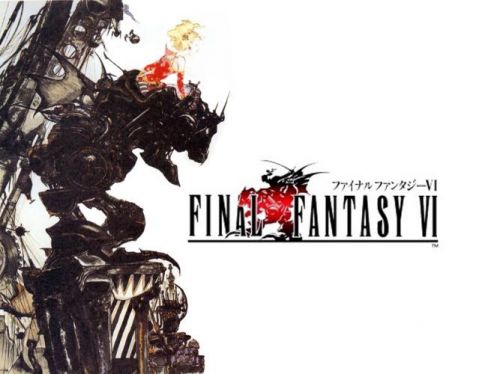
Felipepepe: One of the most famous JRPGs ever, Chrono Trigger is a brilliant game. It brought innovative concepts to the stale JRPG genre such as removing random encounters and putting battles on the same levels as exploration, team attacks and combos, multiple endings, new game+ mode, and even some degree of C&C. As a result, Chrono Trigger feels fresh even today. The gameplay explores time travelling very well, both for story and puzzle design, and the characters designed by Akira Toriyama (of Dragon Ball fame) are some of the most iconic in gaming. A game truly worthy of #1.
Tied with Chrono Trigger at #1, Final Fantasy VI departed from the magical lands of the past games and sent the player into a grim(dark) technological future, where magic had died and the world was ruled by an evil empire. A solid game, with the classical combat of the series at its height, lots of party members, great boss battles and many memorable events. Even today, moments such as the famous opera scene, with small sprites "singing" via the SNES audio chip, remain impressive to this day.
Damned Registrations: Not too surprised Chrono Trigger made it to the top of the list. Although it isn't my favourite, it's probably the most well done jrpg ever made from a design standpoint. The characters feel very distinct, both in personality and in their uses in battles. The battles are interesting despite the lack of difficulty, due to all the different abilities and equipment you have access to. The world is fun to explore, going into some random cave or dungeon on the world map just because you can, and finding cool shit inside you can't get anywhere else always felt great, as did time travel shenanigans that rewarded players who were clever. Well, clever is overstating it. Players who weren't retarded got rewarded. But hey, that's more faith than most games put in their players, even for rpgs.
I'm not actually sure Final Fantasy VI deserves to be in the top 10, however. I don't think it even made my top 25. I have a soft spot for the game though, since it was my first rpg ever. Like Chrono Trigger (and most decent rpgs) it had decent variation between characters, and lots of neat one of a kind equipment scattered around the world that made you excited to find a treasure chest, especially one stashed in a hidden passageway. However, though the esper system was cool, it detracted from the characters individuality, leaving them only with their special command and equipment options. The world had some cool secrets to be found, especially in the second half of the game.
Jasede: Chrono Trigger. Whenever someone asks the question which Japanese console RPG to try first the answer is almost universally accepted to be Chrono Trigger. It's difficult to list flaws in this game because, using the standards that one would use to judge its peers, it has no noticable ones. The story is paced well and engaging, the combat does not waste your time, the music is outstanding and a class of its own and there even is replay value, considering this is the game that single-handedly popularized New Game+.
Perhaps the most beloved old-generation Final Fantasy game, Final Fantasy VI is the one I would recommend for casual play. It is extremely well-crafted, with excellent sound and art design, along with a plot that was, at the time, quite innovative. High production values aside, the combat is on the easy end of the series and even though there are many party members, they are not very customizable. And by not very I mean not at all. Those looking for a challenge are better off playing Final Fantasy IV, easily available on the DS in the format of an excellent remake.
Average Manatee: Final Fantasy VI has an abrupt change half way in that has to be one of the best gaming moments of all time. I'd be interested to hear of another game that can deliver the metaphorical kick to the balls of letting the villian win, become a god, destroy the world, then skip to a post-apocalyptic wasteland where the rest of the party is missing and presumed dead, you are stranded on an island, and your new main character just attempted suicide.
Clockwork Knight: Chrono Trigger is a real adventure. Toriyama's style makes even minor characters recognizable and easy to sympathise with. Though the game does have a big focus on the story, it is always flowing very fast, and you never feel like you're playing through filler someone put there to make the game last 60 hours. The pacing is just perfect. If I could think of one bad side, it would be that apart from some select boss fights, the game's pretty easy.
Final Fantasy VI has a story which is your average "ragtag bunch of misfits dights against the evil empire" until the true villain takes the spotlight. Kefka's mania turns him into a villain that puts a smile on your face whenever he appears onscreen, because you know he's gonna either do something awesome, or something funny. There's not much to say gameplay-wise, as FF6 doesn't innovate much in that respect. If you played any of the previous titles, the only striking change you'll notice is that the characters aren't as defined by their job as before, each having one or two unique skills in battle. The espers give a taste of what is to come in FF7, which is a departure from specialized classes into generalists. The characters still belong to "classes", but the limits are much softer now and it's possible to mold characters to your liking.
And with that, we wrap up this list of the Codex' top 10 RPGs, both PC and Console. Decline or incline? You'll surely let us know in the comments.
There are 497 comments on RPG Codex People's Awards: Best RPGs














